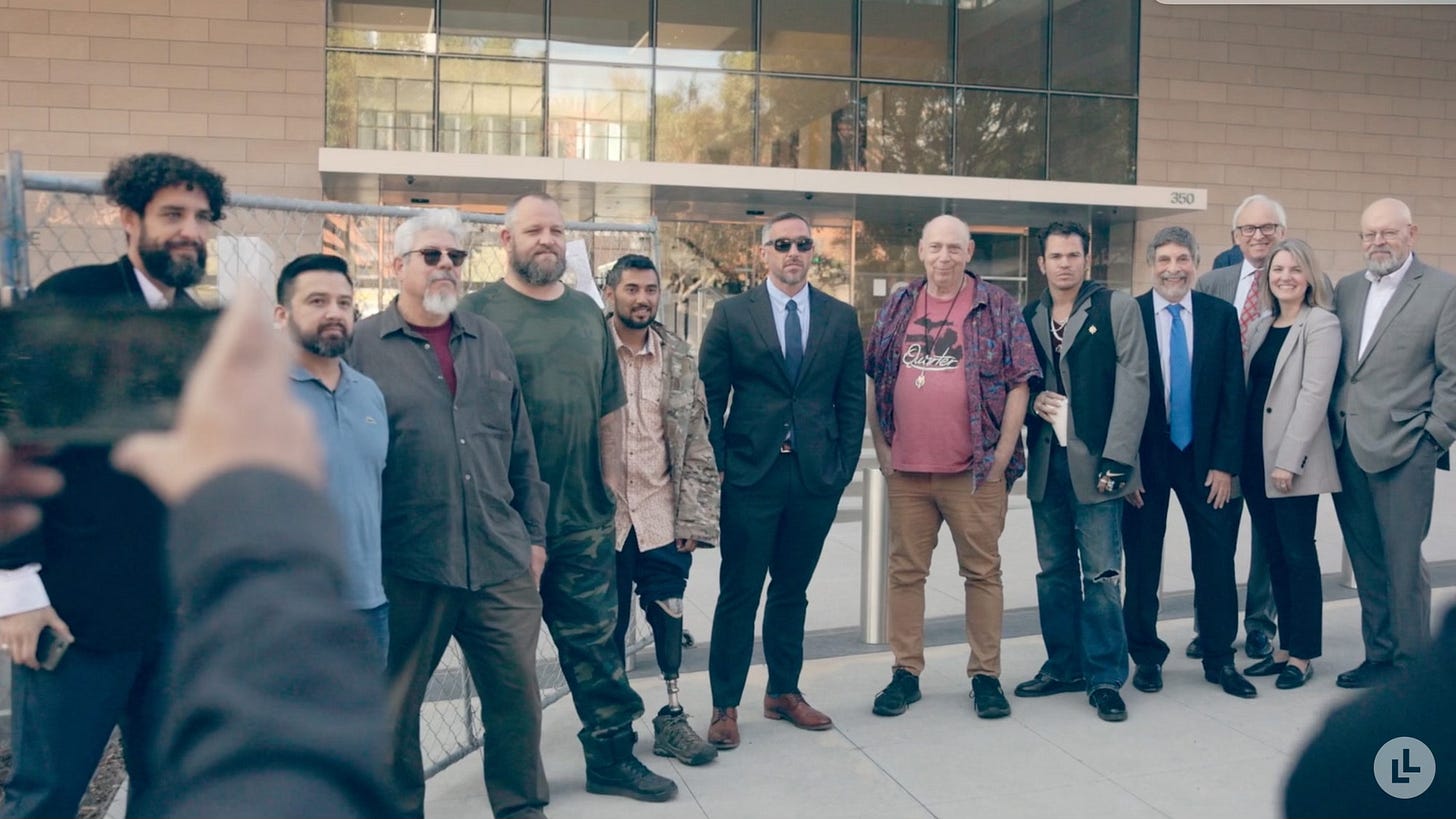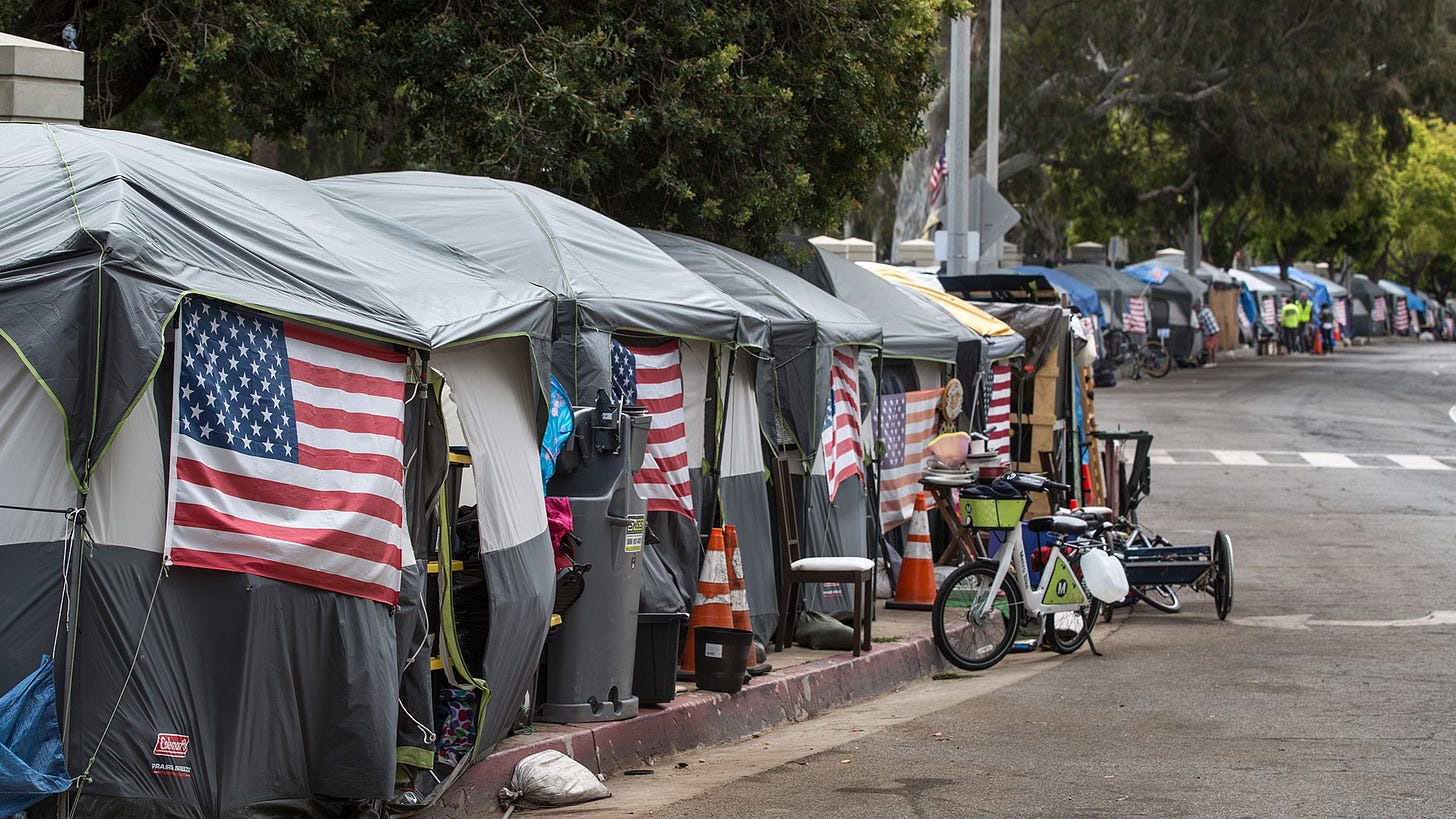The people's court reporter: Meghann Cuniff on bridging law and pop culture
Exploring the intersection of law, pop culture, and social media with one of legal journalism’s rising stars.
In an era where legal reporting often takes a backseat to sensationalism, Meghann Cuniff stands out. She’s a beacon of old-school journalism with a modern twist. Known affectionately as "Meghann Thee Reporter" by her devoted following on social media, Cuniff has carved out a niche in the world of legal affairs reporting, bringing clarity and context to some of the most high-profile cases in recent memory. She writes the Legal Affairs and Trials with Meghann Cuniff newsletter and has previously published work at Law & Crime.
Starting today, she will be writing the Home of the Brave newsletter for Long Lead, which covers Powers v. McDonough, a lawsuit unhoused veterans in Los Angeles have brought against the U.S. Department of Veterans Affairs. It’s a part of Home of the Brave, the latest feature from Long Lead.
Cuniff's journey from a small-town McDonald's employee to one of the most respected voices in legal journalism is a testament to her tenacity and commitment to the craft. Her coverage of rapper Tory Lanez's trial for shooting Megan Thee Stallion catapulted her into the national spotlight, earning her a dedicated following among hip-hop fans and legal professionals alike.
But Cuniff's expertise extends far beyond celebrity trials. Whether she’s live-tweeting from a courtroom or diving deep into complex federal cases, Cuniff's approach remains the same: lead with facts, stay fair, and make the intricacies of the legal system accessible to all.
In this edition of Depth Perception, we sit down with the Los Angeles-based Cuniff to discuss her unique approach to legal reporting, the challenges of covering high-profile cases in the age of social media, and how she maintains her journalistic integrity while navigating her newfound fame. From the hallways of the First Street U.S. Courthouse in downtown Los Angeles to the digital realm where her words carry significant weight, Cuniff offers us a glimpse into the evolving landscape of legal journalism and her place within it. —Parker Molloy
Why did you become a journalist?
I’ve been interested in journalism my whole life. I grew up in Corvallis, Oregon, and worked for the high school paper, which was my first experience reporting and writing articles. I was the opinion editor of the Corvallis High School High-O-Scope. I was always interested in politics and wanted to be a political journalist, working in the White House and writing about presidents and politics.
What story of yours are you proudest of?
Sometimes it's the little stories that stand out the most. When I worked at the Orange County Register, we heard about the city of Laguna Beach giving out parking passes to former city council members. Residents paid a certain price each year for these passes to bypass tourists downtown. We discovered the city council was giving away these passes to anyone who’d ever served in city government.
I wrote a story about it, which led to the council revoking the parking passes. They cited my article when they changed their minds at the council meeting. It’s always a reminder of the power of journalism. I've tried to translate that into larger stories as I cover court cases and profile national figures. This approach has led to me being proud of my coverage of the Megan Thee Stallion and Tory Lanez case, where I was able to connect with readers and carve out my own coverage area.
Court is in session: Follow the vets’ fight for housing against the VA
In Powers v. McDonough, a group of disabled veterans are suing the federal government, seeking permanent housing on the West Los Angeles VA campus. Meghann Cuniff is covering the case, daily, for Long Lead, with the Home of the Brave newsletter. Sign up now — the trial begins August 6.
What’s the best journalistic career advice you ever received?
Some of my favorite advice early on was to seize all opportunities: join the college paper, look for a community newspaper, try to read as much news as you can, and really look at what other journalists are doing. One piece of advice for interviews is if a question sounds really crazy, you should definitely ask it. Another piece of advice, which you should take with a grain of salt, is don’t always listen to your editors. Listen to your heart and pursue the truth.
What is the worst journalistic career advice you’ve ever received?
I think the worst advice would be something that makes young journalists think they’re too good to go to a small town and cover a city council, or something that would make them devalue those positions. It’s important not to get caught up in corporate ladder climbing or office politics, as the traits of a good reporter don’t always align with what gets you advanced in some newsroom structures.
Were there any stories early in your career that significantly shaped your approach to reporting?
At the college paper, one of the first big scandals I covered involved our student government. They had gone on a retreat to Sun River, Oregon, and left an inappropriate note in the guestbook of their rental house. The owner complained to the administration, and the student government got in trouble.
Reporting on that story taught me and my colleague about gumshoe reporting and the value of contacting people, meeting them in their own space, and trying to get the actual story. This experience prepared me for my work at the Spokesman Review, where I was surrounded by older reporters who had been doing this kind of reporting for decades. Seeing how they worked was really influential in my career.
You’ve covered a number of high-profile cases. How do you prepare for such extensive coverage?
You just have to dive in and get ready for it. Covering pre-trial cases and familiarizing yourself with the case is good, but it's also about maintaining a healthy routine. Stay hydrated, eat well, get enough sleep, and prepare for long days. You need to be ready to work longer hours than usual if you want to write the story, manage social media, and be present in court. It’s busy, but with proper preparation, it can become natural.
It’s the story of a land grab dating back to the U.S. Civil War, bursting with government malfeasance, neglect, graft, and even death.
Experience “Home of the Brave,” the latest feature from Long Lead.
What’s one app, tool, or service that you can’t do your work without?
I definitely couldn't do my job without PACER, the federal courts document system. Along with that, Court Listener from the Free Law Project is a great service. They recap documents, making them freely viewable through PACER. This gives me access to all the federal court documents, which is a crucial tool.
I also use Otter, the transcription service, for my interviews. Social media is crucial to me as an independent journalist for promoting my work and getting eyeballs on my stories beyond my subscriber list.
What are some of the biggest challenges you face as a journalist today?
One of the biggest challenges is maintaining momentum while figuring out how to translate that into sustainable income. I have a big presence on Twitter, but the monetization there doesn't compare to YouTube and TikTok. For example, with the Young Thug trial in Atlanta that I've been covering, I’ve focused more on TikTok and YouTube over Twitter because of the greater monetization potential. As a journalist, you eventually have to consider these financial aspects.
Finally, what makes you feel hopeful for the future of journalism?
What makes me hopeful is that so many people are still hungry for good journalism. There’s ongoing debate over what constitutes good journalism, but people are still interested and want information now more than ever. There are still those who push back against the echo chamber of disinformation. While some people aren’t responsible in their roles, there are many who are, and I think we need to focus on and support them. Hopefully, they’ll rise up because the cream always rises to the top.
MORE READING FROM MEGHANN CUNIFF
“Jury Convicts Rapper Tory Lanez on All Charges in Shooting of Megan Thee Stallion, After Day of Deliberations” (Law & Crime, Dec. 23, 2022)
“Disgraced Hollywood Producer Harvey Weinstein Has Been Found Guilty of Raping Model, Now Stands Convicted from Coast to Coast” (Law & Crime, Dec. 19, 2022)
“Judge Declares Mistrial in That ’70s Show Star Danny Masterson’s Rape Trial After Jury Deadlocks Again, with Most Favoring Acquittal” (Law & Crime, Nov. 30, 2022)
“Federal Jury Sides with Cardi B in Lawsuit from Man Who Claimed His Tattoo Was Misused on the Star’s Mixtape Cover” (Law & Crime, Oct. 21, 2022)









